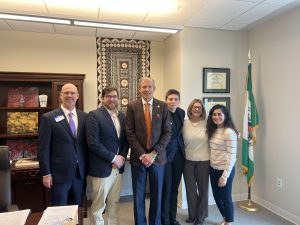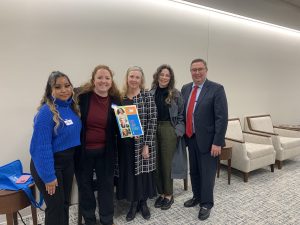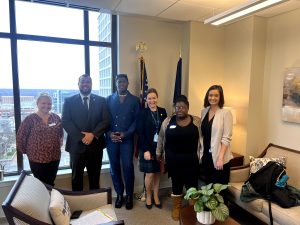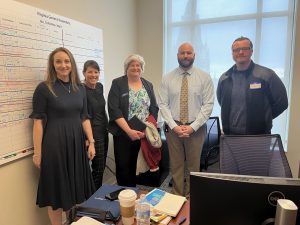Annual Foster Care Advocacy Day took place on January 31, and it was a huge success!
On Foster Care Advocacy Day, the Children’s Home Society of Virginia leads groups of advocates, families, and youth through the General Assembly to meet with legislators and lift the voices of those with foster care experience. Attendees share with legislators why they should focus on foster care issues during the year’s General Assembly session.
 The Virginia General Assembly is the legislative body of the Commonwealth of Virginia. The General Assembly is a bicameral body consisting of a lower house, the Virginia House of Delegates, and an upper house, the Senate of Virginia. Combined, the General Assembly consists of elected representatives from an equal number of constituent districts across the commonwealth. This branch of government makes and changes the laws of the Commonwealth of Virginia.
The Virginia General Assembly is the legislative body of the Commonwealth of Virginia. The General Assembly is a bicameral body consisting of a lower house, the Virginia House of Delegates, and an upper house, the Senate of Virginia. Combined, the General Assembly consists of elected representatives from an equal number of constituent districts across the commonwealth. This branch of government makes and changes the laws of the Commonwealth of Virginia.
The Virginia General Assembly meets in January of every year. In even years, session is 60 days. In odd years, session is typically 46 days.
Virginia has one of the highest rates of youth aging out of foster care in the whole country. Children and youth in foster care experience trauma at high levels that impact the rest of their lives. The Children’s Home Society of Virginia is working to improve the foster care system to promote permanency for children and youth and improve the life outcomes of youth with foster care experience. To do that, we try to ensure legislators prioritize these issues as they work through the 2024 General Assembly session, especially on Foster Care Advocacy Day.
Keep reading our blog to learn more about how this year’s Foster Care Advocacy Day went.
2024 Foster Care Advocacy Day in Richmond, Virginia
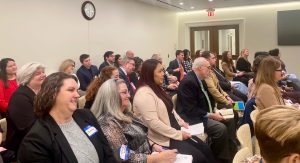 This year, 34 individuals collaborated with us during Foster Care Advocacy Day, marking our largest turnout yet! We began the day as a big group listening in on the Foster Care Caucus meeting, where legislators provided updates on ongoing efforts and future initiatives related to youth in foster care. Then, we divided into smaller groups and engaged with more than 30 legislators.
This year, 34 individuals collaborated with us during Foster Care Advocacy Day, marking our largest turnout yet! We began the day as a big group listening in on the Foster Care Caucus meeting, where legislators provided updates on ongoing efforts and future initiatives related to youth in foster care. Then, we divided into smaller groups and engaged with more than 30 legislators.
Two youth from our My Path Forward Program participated and did a wonderful job speaking to the legislators.
In January, we led a group of families, youth, and advocates through the General Assembly to lift the voices of children, youth, and families affected by the foster care system. We hope that the stories shared during Foster Care Advocacy Day will serve as a poignant reminder to legislators of the crucial support needed by Virginia’s youth. We appreciate everyone who participated on this significant day!
Top Priority 2024 Foster Care Bills and Foster Care Related Budget Items
While we are supporting many initiatives during this General Assembly session, our top priorities this session have been:
- SB39/HB27 Kinship as Foster Care Prevention Program (Favola/Callsen)
- HB 1313 Fostering Futures program; eligibility; age limit (Tata)
- Budget Amendments Establishing Centralized Training Academy for Local Departments of Social Services
SB39/HB27 Kinship as Foster Care Prevention Program (Favola/Callsen)
Virginia lacks a formal Kinship Prevention program, which results in children and youth unnecessarily entering the foster care system and enduring the trauma of foster care.
Virginia has spent years working toward the prevention of children entering foster care, and it is time to formally implement that program.
Research shows children who are placed with relatives or kin are more likely to have more stability and better life outcomes than those placed with strangers. Kinship families need financial and other supports to be able to care for their relative children.
Creating a Kinship as Foster Care Prevention Program will allow more at-risk children to be placed with relatives and kin and fewer children to enter into foster care, increasing permanency for children. This will also allow Virginia to more easily identify the number of children being diverted from foster care into kinship care and ensure their placements remain safe, stable, and supported by the local departments of social services.
HB 1313 Fostering Futures program; eligibility; age limit (Tata)
Virginia has between 450 and 600 youth who age out of foster care each year. Studies show that youth with foster care experience are more likely to become homeless, incarcerated, unemployed, or under-employed.
Through the Fostering Futures program, Virginia supports many youth who have aged out of foster care until they turn 21 and are no longer eligible for these transitional supports.
This bill would extend the cut-off age from 21 to 23, which would give youth more time to acclimate to adulthood.
Many youth are not yet prepared by the age of 21 to be fully independent, regardless of their childhood experiences and whether they have a stable, supportive family. Very few youth have even graduated college by the age of 21, much less obtained long-term sustainable employment, and are typically still supported, at least in part, by their families.
Youth who have aged out of foster care have sustained significant childhood trauma and need even more supports during the transitional period into adulthood. Unfortunately, it is also often youth who have aged out of foster care who do not receive any familial support, financially or otherwise.
Extending the supports of the Fostering Futures program to youth until they turn 23 will allow youth more time to attain their educational goals, obtain sustainable employment, and find stable, long-term housing. Extending supports by just two years can significantly impact the long-term life outcomes of youth who have aged out of foster care.
This can impact the rates of incarceration, homelessness, and the rates at which youth can obtain four-year college degrees and maintain employment at a level that provides them self-sufficiency in adulthood. Investing in youth from the ages of 21 through the age of 23 is an investment in the rest of their lives.
While this bill did not survive through Crossover this year, we will continue to advocate for this change during future General Assembly sessions and welcome you to join us in these efforts!
Budget Amendments Establishing Centralized Training Academy for Local Departments of Social Services
Virginia’s social services workforce is in crisis. Caseworkers handle highly sensitive issues surrounding the safety and well-being of Virginia’s at-risk children and youth. Virginia’s social services workforce has had a significant turnover rate, which directly impacts the services provided to vulnerable children and families. Additionally, the current training model, which is more than 30 years old, takes two years to complete, meaning a large part of the workforce is not fully trained while working with vulnerable children and families.
Failing to solve these issues puts Virginia at risk for:
- High error rates resulting in federal financial penalties
- An untrained workforce dealing with highly sensitive and important issues relating to the safety and well-being of children
- An overburdened and understaffed workforce without the appropriate capacity to be successful
Virginia needs to create and fund a training academy based on best practices to fully train staff from the start. This is also a recommendation of the Virginia Commission on Youth.
The training academy would:
- Ensure a fully trained workforce by providing upfront, initial training before working with vulnerable children and families
- Update training content based on best practices and what has been learned about adult learning over the past three decades
By investing in stabilizing the workforce, caseworkers will have the capacity to focus on the families, increase permanency rates, and reduce the length of time children remain in foster care.
There is a lot to be done when it comes to systemic change for children, youth, and families touched by the foster care system. We will continue fighting for Virginia’s at-risk youth until all children and youth in Virginia have permanent families and the supports they need to thrive in adulthood.
How to Support Foster Care Advocacy
To help support our foster care advocacy work, everyone can contact their legislators! We have legislators who represent us and they have constituents. They need to hear from people they directly represent to know these issues are important to those in their district. You can find out who your representatives are by using this link: Who’s My Legislator?
“In terms of making systemic change, we need to spread more awareness to the general public. As a state, we have so many youth aging out of foster care, and it’s something the general public needs to be aware of. Having more conversations will ultimately reach the people who can adopt.” – Cassie Plevelich, CHSVA Chief Operating Officer
If you want to learn more about raising awareness, please reach out to Cassie for more information: 804-353-0191, ext. 334 | [email protected]
If you want to stay up-to-date on legislation relating to this year’s General Assembly, sign up for our advocacy blog below.

